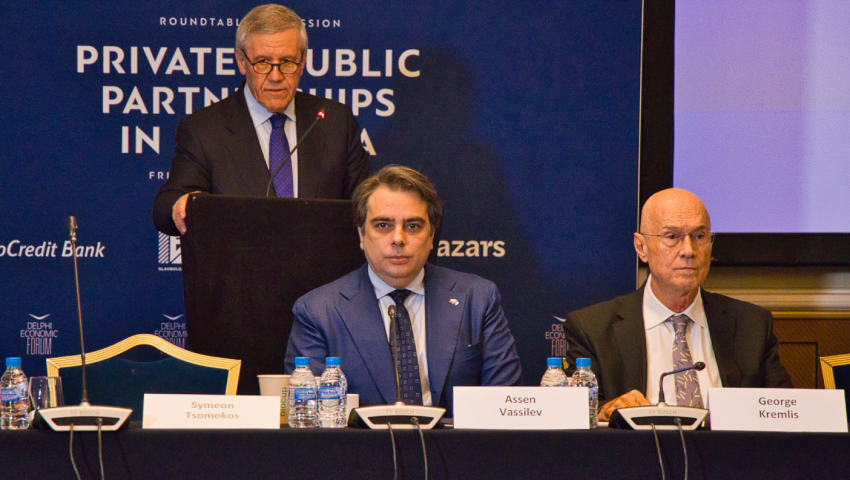The Minister of Finance Asen Vasilev: It is necessary to improve the legislation on public-private partnership

The draft state budget for 2024 will be revised so that next week it can be discussed at a tripartite council, adopted by the Council of Ministers and submitted for consideration in the National Assembly. This was announced by the Minister of Finance Asen Vasilev after an expert meeting with the government-supporting parties in the parliament today. He specified that the main part of the budgetary macro-framework remains the same as it is in the draft of the Ministry of Finance. One major change has been agreed upon, as the anticipated contribution from the additional fee of BGN 20/mWh for gas transmission from Gazprom is dropped in the revenue part, as it is not 100% certain that it will be realized. Accordingly, the expenditure part for capital investments is reduced by the same amount - from just over BGN 12 billion to just under BGN 10 billion.
An agreement was also reached on the preparation of lists of national priority projects and priority municipal projects to be financed from the budget, for which a fund of BGN 1 billion is foreseen. "Back in 2021, I proposed that this fund be redistributed from the parliament. This is currently accepted. So we totally agree there. "Municipalities will have to work a little faster in order to be ready with their priority projects by December 11-12, so that they can be included between the first and second reading," said the Minister of Finance.
"As for the list of national priority projects, it exists, but it has never been systematized. It is good to be systematized and presented in the budget so that it is clear exactly what the funds are spent on. It is not only about projects of the Ministry of Regional Development and Public Works for the construction of highways, but also about railway construction, for the purchase of new trains, helicopters for emergency medical assistance. These are all priority projects included in the capital program. It is good that they are clearly presented, with clear deadlines and with commitments from the relevant ministries that these projects will happen", explained Asen Vasilev. He recalled that funds have been given over the years, but they are not used because some projects cannot be implemented by the respective contractors.
Minister Vasilev assessed the decision reached on the derogation for the import and processing of Russian oil as extremely useful for Bulgarian citizens. According to him, on the one hand, exports are stopped and, accordingly, money going to Russia, export quotas are reduced, and, on the other hand, by setting March 1, 2024 as the end date of the derogation, it is guaranteed that there will be no upheaval in the internal fuel market and accordingly there is enough time for a smooth transition without raising prices for Bulgarian citizens.
Since the formation of this government, it has been a heavy compromise option for the country to move forward on several key goals - Schengen, the Eurozone, raising people's incomes. All of this is included in the government program, this government has a clear horizon of 18 months to fulfill these goals, Finance Minister Asen Vasilev told BNT late this evening.
He also commented on the decision to reject the draft law to drop the derogation within three days. "We had a normal conversation, there were two things that were talked about - one is that no more money should go to Lukoil and from there to Russia, and the other is not to raise fuel prices for Bulgarian citizens and to have enough time, to be able to switch to non-Russian oil. The decision actually protects both points. We are stopping exports, which stops a large part of the money for Russia as soon as possible - on January 1 next year. On March 1, which is technically the minimum period to be able to switch to non-Russian oil without jeopardizing the supply and supply of fuels in the country, the derogation is stopped completely," explained the Minister of Finance.
According to him, in order for Bulgarian citizens to have access to fuel at normal prices, there is technological time for this process to happen. "There are reports from the Ministry of Energy, the Ministry of Economy, and the security services that analyzed these risks and gave a program that is optimal," explained Asen Vasilev.
There are concerns about the budget, which, in my opinion, are unfounded and they are related to the inclusion of the revenues from the transmission fee for Russian gas in the revenue part, Asen Vasilev said about the decision that the draft state budget will be revised and submitted to the parliament again next week. "Colleagues have concerns, we took away these revenues, accordingly we reduced the capital program and investments. It still remains a record, but in this way the budget comes within the framework. When these revenues are realized, we will be able to update and complete our capital program as it was originally conceived," explained the finance minister.
